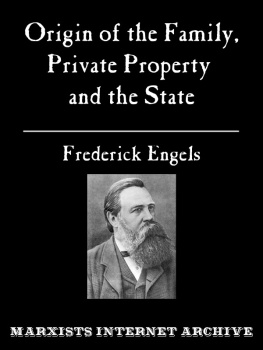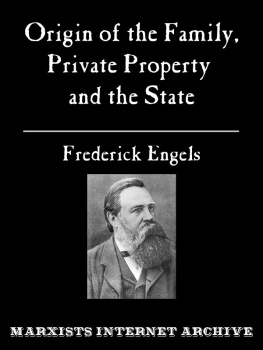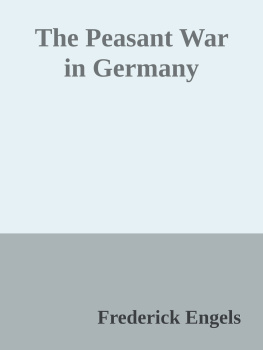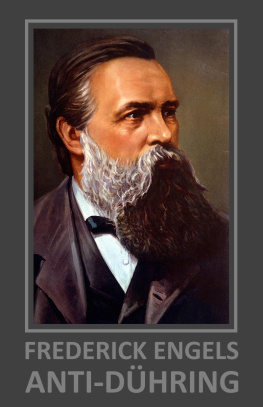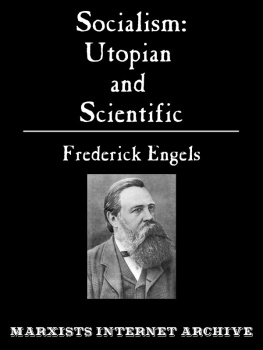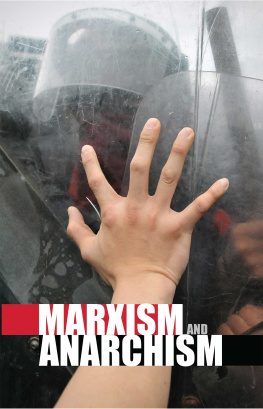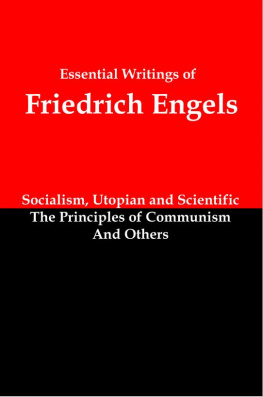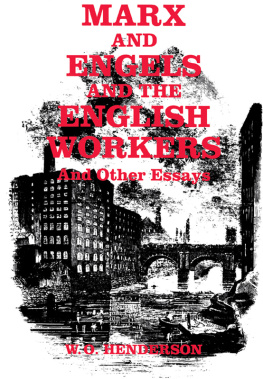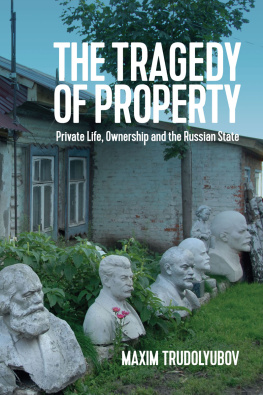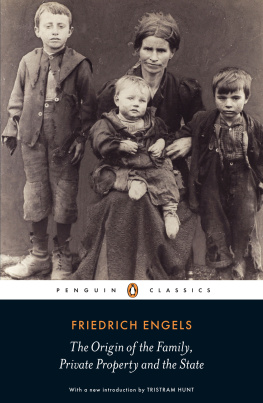Frederick Engels - Origin of the Family, Private Property and the State
Here you can read online Frederick Engels - Origin of the Family, Private Property and the State full text of the book (entire story) in english for free. Download pdf and epub, get meaning, cover and reviews about this ebook. year: 2001, publisher: ElecBook, genre: Religion. Description of the work, (preface) as well as reviews are available. Best literature library LitArk.com created for fans of good reading and offers a wide selection of genres:
Romance novel
Science fiction
Adventure
Detective
Science
History
Home and family
Prose
Art
Politics
Computer
Non-fiction
Religion
Business
Children
Humor
Choose a favorite category and find really read worthwhile books. Enjoy immersion in the world of imagination, feel the emotions of the characters or learn something new for yourself, make an fascinating discovery.
- Book:Origin of the Family, Private Property and the State
- Author:
- Publisher:ElecBook
- Genre:
- Year:2001
- Rating:3 / 5
- Favourites:Add to favourites
- Your mark:
- 60
- 1
- 2
- 3
- 4
- 5
Origin of the Family, Private Property and the State: summary, description and annotation
We offer to read an annotation, description, summary or preface (depends on what the author of the book "Origin of the Family, Private Property and the State" wrote himself). If you haven't found the necessary information about the book — write in the comments, we will try to find it.
Frederick Engels: author's other books
Who wrote Origin of the Family, Private Property and the State? Find out the surname, the name of the author of the book and a list of all author's works by series.
Origin of the Family, Private Property and the State — read online for free the complete book (whole text) full work
Below is the text of the book, divided by pages. System saving the place of the last page read, allows you to conveniently read the book "Origin of the Family, Private Property and the State" online for free, without having to search again every time where you left off. Put a bookmark, and you can go to the page where you finished reading at any time.
Font size:
Interval:
Bookmark:
From http://www.marxists.org/archive/marx/works/1884/origin-family/index.html
Converted to eBook by Andrew Lannan

Written: March-May, 1884;
First Published: October 1884, inHottingen-Zurich;
Source: Marx/Engels Selected Works, Volume Three;
Translation: The text is essentially the Englishtranslation by Alick West published in 1942, but it has been revised againstthe German text as it appeared in MEW [Marx-EngelsWerke] Volume 21, Dietz Verlag 1962, and the spelling of names and otherterms has been modernised;
Transcription/Markup: Zodiac/BrianBaggins;
Online Version: Marx/Engels Internet Archive(marxists.org) 1993, 1999, 2000.
Proofed and corrected: Mark Harris 2010
A fter Marxs death, inrumaging through Marxs manuscripts, Engels came upon Marxs precis of Ancient Society a book by progressive USscholar LewisHenry Morgan and published in London 1877. The precis was written between1880-81 and contained Marxs numerous remarks on Morgan as well aspassages from other sources.
After reading the precis, Engels set out to write aspecial treatise which he saw as fulfilling Marxs will. Workingon the book, he used Marxs precis, and some of Morgans factualmaterial and conclusions. He also made use of many and diverse data gleaned inhis own studies of the history of Greece, Rome, Old Ireland, and the AncientGermans.
It would, of course, become The Origin of theFamily, Private Property and the State the first edition of whichwas published October 1884 in Hottingen-Zurich.
Engels wrote The Origin of the Family, PrivateProperty and the State in just two months beginning toward the endof March 1884 and completing it by the end of May. It focuses on early humanhistory, following the disintegration of the primitive community and theemergence of a class society based on private property. Engels looks into theorigin and essence of the state, and concludes it is bound to wither awayleaving a classless society.
Engels: Along with[the classes] the state will inevitably fall. Society, which will reorganiseproduction on the basis of a free and equal association of the producers, willput the whole machinery of state where it will then belong: into the museum ofantiquity, by the side of the spinning-wheel and the bronze axe.In 1890, having gathered new material on the history ofprimitive society, Engels set about preparing a new edition of his book. Hestudied the latest books on the subject including those of Russianhistorian Maxim Kovalevsky. (The fourth edition, Stuttgart, 1892, was dedicatedto Kovalevsky.) As a result, he introduced a number of changes in his originaltext and also considerable insertions.
In 1894, Engelss book appeared in Russiantranslation. It was the first of Engelss works published legally inRussia. Lenin would later describe it as one of the fundamental works ofmodern socialism.
T he following chapters are, in a sense,the execution of a bequest. No less a man than Karl Marx had made it one of hisfuture tasks to present the results of Morgans researches in the light of theconclusions of his own within certain limits, I may say our materialisticexamination of history, and thus to make clear their full significance. ForMorgan in his own way had discovered afresh in America the materialisticconception of history discovered by Marx forty years ago, and in his comparisonof barbarism and civilization it had led him, in the main points, to the sameconclusions as Marx. And just as the professional economists in Germany werefor years as busy in plagiarizing Capital as they were persistent in attemptingto kill it by silence, so Morgan's Ancient Society received precisely the same treatment from thespokesmen of prehistoric science in England. My work can only provide aslight substitute for what my departed friend no longer had the time to do. ButI have the critical notes which he made to his extensive extracts from Morgan,and as far as possible I reproduce them here.
According to the materialistic conception, the determining factor in historyis, in the final instance, the production and reproduction of the immediateessentials of life. This, again, is of a twofold character. On the one side,the production of the means of existence, of articles of food and clothing,dwellings, and of the tools necessary for that production; on the other side,the production of human beings themselves, the propagation of the species. Thesocial organization under which the people of a particular historical epoch anda particular country live is determined by both kinds of production: by thestage of development of labor on the one hand and of the family on the other.
The lower the development of labor and the more limited the amount of itsproducts, and consequently, the more limited also the wealth of the society,the more the social order is found to be dominated by kinship groups. However,within this structure of society based on kinship groups the productivity oflabor increasingly develops, and with it private property and exchange,differences of wealth, the possibility of utilizing the labor power of others,and hence the basis of class antagonisms: new social elements, which in thecourse of generations strive to adapt the old social order to the newconditions, until at last their incompatibility brings about a completeupheaval. In the collision of the newly-developed social classes, the oldsociety founded on kinship groups is broken up; in its place appears a newsociety, with its control centered in the state, the subordinate units of whichare no longer kinship associations, but local associations; a society in whichthe system of the family is completely dominated by the system of property, andin which there now freely develop those class antagonisms and class strugglesthat have hitherto formed the content of all written history.
It is Morgans great merit that he has discovered and reconstructed in itsmain lines this prehistoric basis of our written history, and that in thekinship groups of the North American Indians he has found the key to the mostimportant and hitherto insoluble riddles of earliest Greek, Roman and Germanhistory. His book is not the work of a day. For nearly forty years he wrestledwith his material, until he was completely master of it. But that also makeshis book one of the few epoch-making works of our time.
In the following presentation, the reader will in general easily distinguishwhat comes from Morgan and what I have added. In the historical sections onGreece and Rome I have not confined myself to Morgans evidence, but have addedwhat was available to me. The sections on the Celts and the Germans are in themain my work; Morgan had to rely here almost entirely on secondary sources, andfor German conditions apart from Tacitus on the worthless andliberalistic falsifications of Mr. Freeman. The treatment of the economicaspects, which in Morgans book was sufficient for his purpose but quiteinadequate for mine, has been done afresh by myself. And, finally, I am, ofcourse, responsible for all the conclusions drawn, in so far as Morgan is notexpressly cited.
Ancient Society, orResearches in the Lines of Human Progress from Savagery, through Barbarism toCivilization, by Lewis H. Morgan, London, Macmillan & Co., 1877. The bookwas printed in America and is peculiarly difficult to obtain in London. Theauthor died some years ago. [For the purposes of this edition, all referencesto Ancient Society are from the Charles H. Kerr edition, Chicago. Ed.]
Font size:
Interval:
Bookmark:
Similar books «Origin of the Family, Private Property and the State»
Look at similar books to Origin of the Family, Private Property and the State. We have selected literature similar in name and meaning in the hope of providing readers with more options to find new, interesting, not yet read works.
Discussion, reviews of the book Origin of the Family, Private Property and the State and just readers' own opinions. Leave your comments, write what you think about the work, its meaning or the main characters. Specify what exactly you liked and what you didn't like, and why you think so.

